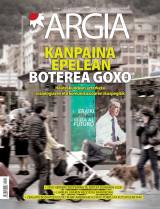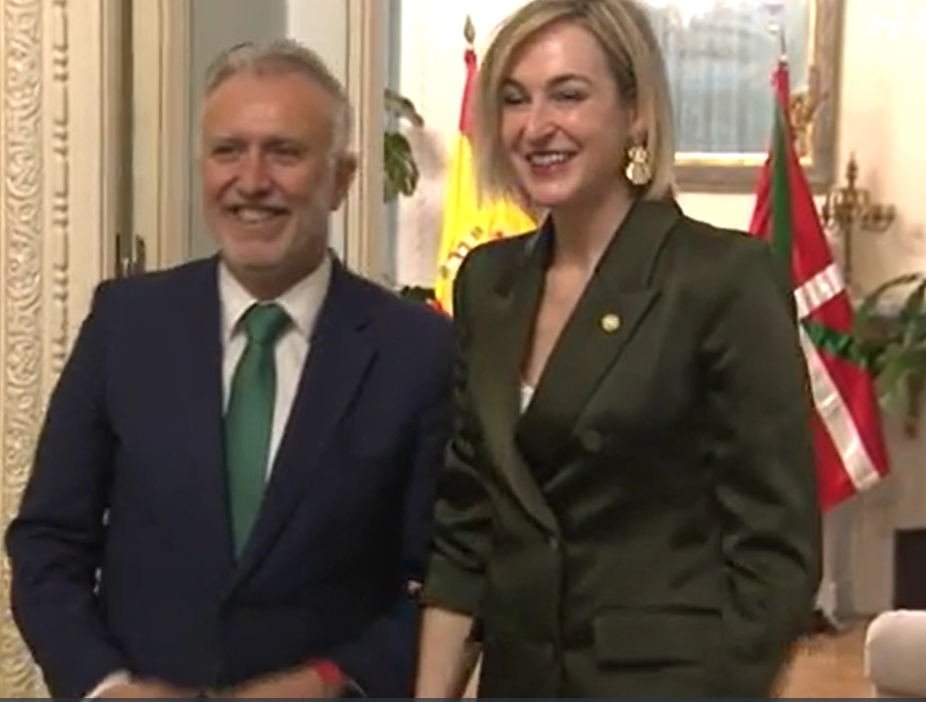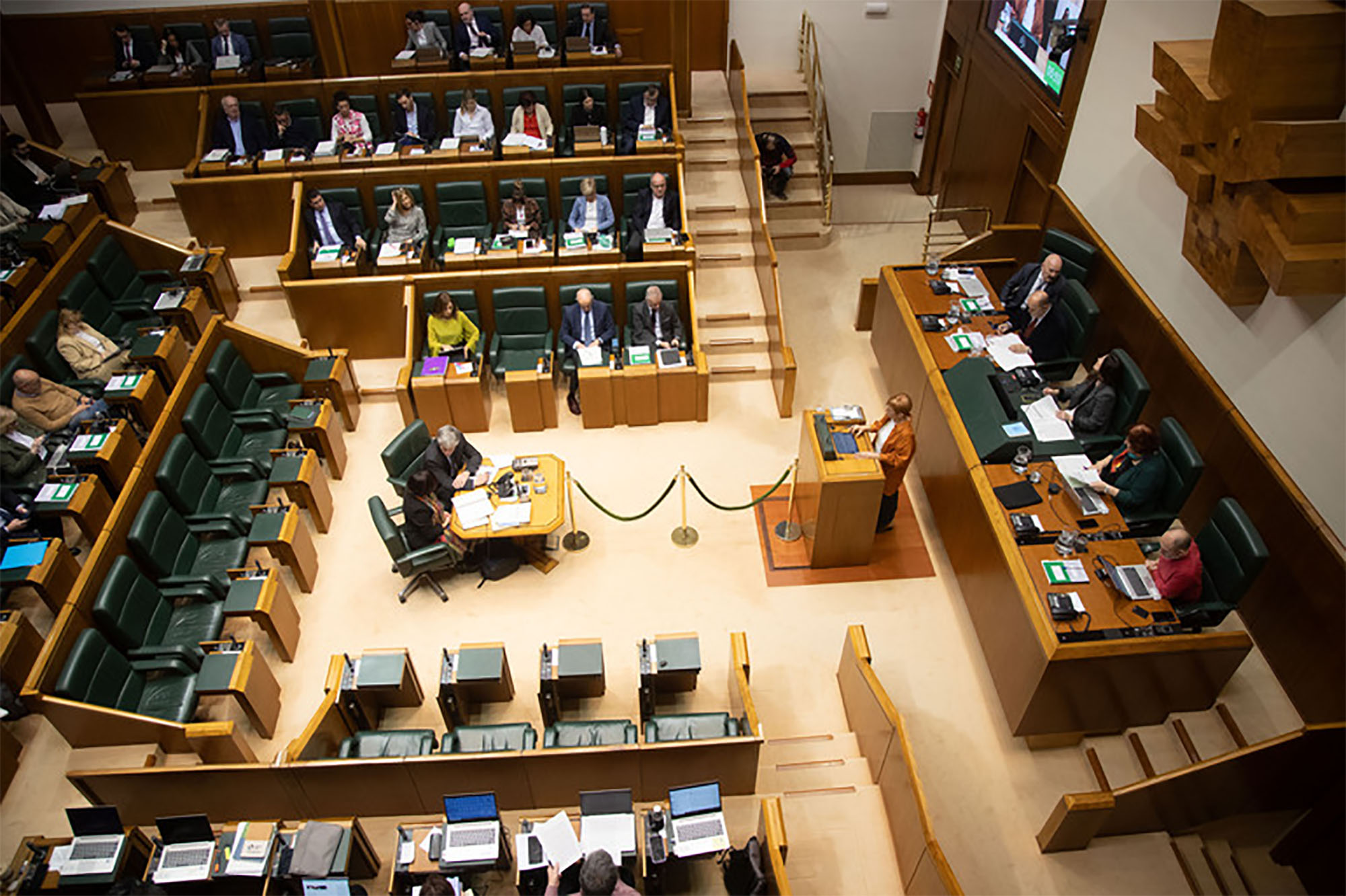In the renewed Parliament, too, are the vaguages for change?
- In the middle of the electoral campaign we have gathered Estitxu Garai Artetxe (Gordexola, 1985), professor of the audiovisual communication and advertising department of the UPV/EHU, and Asier Etxenike Ugarte (Orereta, 1979), a member of the sociology centre Aztiker. We can change the Basque Parliament and therefore see new agreements.

How did you see the campaign?
Estitxu Garai: The campaign has been very short, with the summer and the early elections, there has been hardly any previous campaign. It has been very difficult to get off the Spanish agenda and when the campaign has been launched, it has started to talk about the issues here.
Asier Etxenike: The whole mess of the Congress of Deputies has been lengthened for a year, now the framework is changed and people will have to be put back in the shortest time. That's new. There is talk of the dual vote – change of vote depending on the type of election – which is coming to Euskal Herria, which has been common in Catalonia. They have also given us less room for this duality. The effects are yet to be seen.
Are people getting tired of the elections or are we glad there are questions?
A. Etxenike: People are tired, especially of having to spend a year talking about the same thing in the Spanish state: whether or not there will be president. When decisions are to be taken, however, people feel that democratic need. Ideas like “If I don’t go, others” are gaining strength and ultimately many people will vote the best of all the bad choices.
R. Garai: In the CAV, many do not even know that they are elections, especially among the youngest. We seem to be talking a lot about politics, but then to what extent are not people from a very specific area? Aren't the interests somewhere else? I do not know whether it has been possible to separate the elections, to make it clear that what is to be voted on now is something else. The data on abstention will be very important.
Polls have a huge influence on the campaign and are used as weapons. Lately, some very misguided forecasting of surveys has generated mistrust in many.
A. Etxenike: One thing is the surveys, another is the estimates and another is the one published. Estimates aren't scientific. In polling polls, a lot of people don't tell you the truth or they don't want to answer. It has a great difficulty and the interpretation of each one of them has a great weight.
What is published is a social construction and has a great force. After the last European elections we were two years without elections, in that period a tremendous boom was given to Podemos and we all took it, by the way, on one plane or another. It later became clear that there was a big leap into reality since its publication. Beyond the manipulation that a punctual estimate can have, even if it does so in all honesty, it can never ensure that that is actually the case. I would rather do this kind of survey every three months to see the trends, which are the most important.
Asier Etxenike:
“What is published about surveys is a social construction and has a great force”
R. Garai: Polls are today political weapons. Surveys have, among other things, made the existence of this dual vote more transparent. What was questioned in all the political debates three months ago, we now have it internalised. It's no coincidence that surveys are multiplying. On the cookery work that surveys have, there's a big ignorance of what sociologists do behind it.
Another pillar of the campaigns is the media. How have you seen their attitude, and especially that of the public media?
R. Garai: It would not be fair to attribute to the media all the bad things, but the media landscape has a great influence on Basque society. There is nothing else to do with the media hearings in Spain. That is why the leftist referents have emerged. In some sectors with the “television = manipulation” scheme, some messages without filters are already being internalized.
The public media should, in particular, ensure diversity in all political debates, try to be a mirror of society in terms of the number and nature of the opinions. There are traps, of course, and in the profiles of journalists, for example, there is a huge imbalance.
The presence of women in the campaign is increasing. Aspect or achievement?
R. Garai: It's the consequence of the feminist struggle. Although there is much to be done, feminism is, fortunately, increasingly taking on centrality in this country, and that also affects political parties. However, the main references of most political parties are men. There is nothing else to do with the PNV election posters to realize that.
A. Etxenike: Because of the desire to win the female vote, because of the desire to create new references or because they believe in feminism, in any case, it is the achievement of the feminist struggle. However, the real life of the parties is not what you see in the posters. If you look at the political responsibilities, the consultants and others, the imbalances in the parties are greater than in the rest of the social structures.
Estitxu Garai:
“The presence of women in this campaign is a consequence of the feminist struggle”
The consequences of the conflict and issues related to identity appear to have lost presence in the campaign for the benefit of work or social justice.
A. Etxenike: Tagging and classifying is complicated. Therefore, it seems that there is a clash between identity and social issues. In my opinion, this dichotomy is largely false. Among other reasons, because the largest left-wing movement in Euskal Herria is identity and will have strength in these elections.
The crisis and neo-liberalism have brought a new political cycle in which issues relating to sovereignty have gained weight. The debate is situated in democratic terms, but it is underpinned by identity, cultural, linguistic, national and other elements. There is a certain confidence that in themselves they are on the right track, hoping that things will improve without doing anything. Language recovery is the most significant example and, therefore, conflict is less visible in these subjects. There is confusion and disorientation, but it is not because these issues are less important.
R. Garai: Okay with Asier. It would be a mistake on the part of the Basque parties to lose the identity axis. Making the speech in democratic terms is reasonable and that people see that the right to decide can lead the Basques to live better, but that does not mean that the fundamental demands of indigenous nature, language or culture must be neglected. I see that there are temptations to move away from speech. In Euskal Herria, for example, being left-wing or revolutionary and Euskaltzale is completely united.
What weight does the concept “At CAPV we are better than in Spain” have?
A. Etxenike: This comparison is an indicator of the absence of a State structure. Economic data place us in this framework, disaggregated by communities within Spain. Even though those in management do not want to underline it, they come on their own. We are constantly moving within that framework. That has a point of complacency for us. They say that we are better than others, gives peace of mind and decreases the passion for struggle. Here, those with power manage it very well. We can and EH Bildu have tried to attack that idea and the PNV has begun to compare it with the European average. This does not make much sense either, as it should be compared to the individual states. Data has a very high communicative weight, and politicians use only the data they like.
R. Garai: Compared to Spain, the data are positive. However, compared to other European countries, we are below. There's a trap there. From an independentist's point of view, it has social potential. In other words, things can be done differently here, and today they are not done because a state structure prevents it. These comparisons have a discursive force. Another thing is that our only referent is Spain. This seems to me to be damaging.
Estitxu Garai:
“It is a pity that it is no longer present in the campaign, that a change of government can be given, that it could generate illusion.”
In Araba and Gipuzkoa, allegiance between the parties is higher, but in Bizkaia, despite the victory of Podemos in the previous elections, it seems that the PNV will win with ease.
A. Etxenike: I'll answer you with what a president of the PNV once said to me: The PNV is a very good service manager. And the citizen has gotten used to asking for that from the administration. As long as you do it right, you'll be there. The PNV has the ability to calm the foci without doing great communicative damage, and to that answer the good results of Bizkaia. There are no conflicts, most of them are committed to the status quo, stability and tranquillity. As in other countries, there have been alternations, possible changes do not generate such fear and, furthermore, there is a greater chance of conflict and distress. In Bizkaia there is no problem in voting for Podemos because something else was decided, but in the elections here many will vote for the PNV.
R. Garai: The PNV knows how to speak very well to its potential voters. The ideas of management and stability are widespread. Stability is projected in organizations as a positive thing. It says that the PNV manages it well, as the antithesis of Spain. The challenge for all those who want to propose Alternatiba is to show that there are also great injustices here and that their representative in the institutions is the PNV, its form of management. There could be the key to connecting with the people in Bizkaia and in the large urban areas.
The illusion of the change that Podemos created in the Spanish state seems to be falling. How are you going to act here?
R. Garai: The motto of EH Bildu “here yes” represented it, that in Spain there can be no change, and here yes. A disillusion that will influence these elections. The phenomenon of Podemos should be analyzed in brand parameters. The trend in politics is widespread: decisions are not taken so much in view of messages, but through general sensations. That of Podemos has had a great influence. I think they have come to be worn out. With the exception of the arrival of Pablo Iglesias, very few people have participated in the events of the electoral campaign of Podemos Euskadi.
A. Etxenike: Many things have done some We can. It was a very emotional vote. We spend the whole day angry, tired of working -- that's why football is successful, because every now and then it makes you feel victorious. In politics that also works a lot, and it was easy to align with Podemos. In addition, in the Spanish elections the possibility of pp running out of pp was disseminated. In the Basque regional elections, however, there are other keys: you do not have to take away the PP and it has also fallen emotionally by the results of Podemos in other countries. Furthermore, they have not succeeded with the candidate. PILI Zabala has been elected because its objective was to attract a large number of votes from the Abertzale left, but I think it has not worked. It will have to be seen whether they are able to mobilise other kinds of votes, less politicised or more humanist. Now it will be shown what the base of Podemos is to a large extent. I believe that the ceiling has been touched, especially in the CAV.
Asier Etxenike:
“Compared to Spain, as we are better than others, it gives tranquillity and decreases the passion for fighting. Here those who have power manage it very well”
Is the pact between EH Bildu and Podemos possible? Are they going to be more than the PNV and the PSE-EE?
R. Garai: I think an opportunity has been missed. They have lost the opportunity to work discursively more than EH Bildu and Podemos, PNV and PSE-EE. Taking this possibility aside seems to me to be a skill of the PNV. Putting Podemos and EH Bildu in the fight and leaving the other areas orphans is a mistake. It is a pity that we are not campaigning, that a more present change of government can take place. He could be deluded. I often see Podemos as an instrument of the state, a tool to look at Catalonia and Euskal Herria, a friendly alternative to sovereign and independentist hunger.
A. Etxenike: In Navarre the change hardly took place and to a large extent because the Navarros put the change on the table, but here I see it impossible. It's not because EH Bildu doesn't want it, it's because they're managing what's here from Madrid, it's very difficult. How are you going to imagine the exit of the PNV in half, doing nothing with EH Bildu? I think for Podemos from here it has been a missed opportunity.
R. Garai: Iker Casanova already said on television that EH Bildu is going to assume the centrality in the Basque Parliament. On the one hand, it shares a country project with the PNV, and on the other, it shares the left-wing social axis with Podemos and on some issues with the PSE-EE. Some agreements have also been reached in this legislature. It would be interesting to see how the PNV position will change if the results were more adjusted. The stability that exists today is good for the PNV.
Two legislatures ago, the PSE-EE and pp “snatched” the PNV from the Government of Vitoria-Gasteiz. Now it looks like they're going to be the main crutches of the PNV.
A. Etxenike: The PNV and the PSE-EE will not achieve an absolute majority in Congress, a situation that had not been known to date at any time. They will rule in a minority and in front of them will have a good number of parliamentarians in the opposite position. Not a party, but the second and third forces. The PNV is good at adapting to the new circumstances and does not know the position that will be adopted Podemos in the future. We do not know whether it will be the substitute for the PSE-EE or whether it will give priority to other policies.
The picture is going to change a lot. New opportunities will be created. For the PNV to make a stability pact with the PSE-EE and pp, against EH Bildu and Podemos, it is very different.
Is collaboration between the PNV and pp possible?
A. Etxenike: To date, I do not see the PP supporting the PNV, because they are immersed in policies of centralization. In Rajoy's investiture session, PNV support for investiture has not been sought because what happened at the Senate table happened. The PP is going to centralize the state, to a reorganization, to recognize the slightest competition, so I find it difficult to support the PNV. I do not see stability in that relationship.
R. Garai: Even in situations that seemed impossible, we've seen them solve each other. The PNV and pp have found a way for the agreements to be shaped to the liking of the two. We can't think of anything as happening in the last few decades.
A. Etxenike: I do not say that the PNV does not have the capacity or the desire, but that the pp will not give them the opportunity to do so. Pp is doing well, bipartisanship has taken the alternatives out of half and, like with the crown, they have changed and go ahead.
Modu labur batean, alderdi bakoitzean zein indargune eta ahulgune ikusten dituzten galdetu diegu Garai eta Etxenikeri. Hemen emaitza.
EAJ
Jarraikortasuna, kudeaketa eta egonkortasunaren kontzeptuetan ikusten du Estitxu Garaik jeltzaleen indargunea. Etxenikek “neurri handi batean berez etorri zaizkien” adierazle ekonomikoen kudeaketa aipatu du. Biak bat etorri dira jeltzaleen ahulguneaz galdetzean: hauteskunde programa ez bete izana. “Erreferenduma agindu zuten 2015erako, ez dute bete eta ez dute azalpenik eman”, dio Garaik. Kontu hau gainerako alderdiek aurpegiratu ez izana ulergaitza egin zaie biei. Etxenikeren ustez, inoiz baino lege gutxiago onartu dira eta ezberdinekin adostasunetara heltzearen leloak funtzionatzen badie ere, neurri batean ez dela bete dio.
Elkarrekin Ahal Dugu
Espainiako marka eta hango erreferentziak dira bere indargunea Garairen ustez. Alderdiaren sorreran hedatu zen olatu horretatik zerbait geratzen zaiela uste du Etxenikek, “horri eusten ahaleginduko dira”. Ahulgunetan hautagai indartsu baten gabezia aipatu dute biek. Bertako egiturak, mezu eta proposamen propioen falta ikusten du Garaik.
EH Bildu
“Mezu politikoa argitzen ari dira eta hautesleriarekin berriz konektatzeko aukera” ikusten dio Etxenikek EH Bilduri. Aurreko hauteskundeetako emaitza txarrak eta hauek utzitako egoera animikoa dira koalizioaren ahulgunea soziologoaren ustez. Garairen ustez indargune da “aurpegi berrien freskotasuna, Otegi kartzelatik atera izana eta zentralitatea irabazi izana”. Halere, ahulgune gisa ikusten du ezker abertzalearen zailtasuna panorama politiko berrian alternatiba Euskal Herrian eta ez Madrilen sor daitekeela ikusarazteko.
PSE-EE
Kanpainaren ardatza Espainian kokatu eta han gerta litekeenean arreta jartzea da sozialisten indargunea Garairen ustez. Halere, gaineratu du hautesleriak ez duela alderdi sozialista ikusten EAJren makulua ez den beste eginkizun batean. Podemosen jaitsieratik agian zerbait arrantzatu dezaketela uste du Etxenikek, baina azken urteetako gainbeherari buelta nekez emango diotela. “Bada azpiko joera bat, soziologikoa, eta ez dute sektore berririk lotzen beren proiektura”.
PP
Inkesta guztiek popularren emaitza txarrak aurreikusten dituzte eta zaila egin zaie biei PPri indarguneren bat bilatzea “Espainiako identitatea eta bandera espainiarra goraipatzetik harago”. Ahulgunetan, Madrildik datorren Alfonso Alonso hautagai zigortua aipatu du Etxenikek. “San Antoneko kasua dela-eta Araban asko mugitu dira gauzak, eta hori gilda baten truke estali nahi izatea, zaila da”. Garaik uste du PPren mezuak Espainiako gizartearekin konekta dezakeela, baina Euskal Herriko errealitatetik oso urrun dagoela. “Inposizioaren eskematik kanpo ezer gutxi dute eskaintzeko eta horrek hemengo joerekin ez du konektatzen”.
2025 amaitu baino lehen Gernikako Estatutuan jasotzen diren eskumen guztiak izatea espero du Jaurlaritzak. Oraindik 25 eskumen falta dira. Transferentzia Batzordea aurreko astean biltzekoa zen baina "agenda arazoak" zirela eta atzeratu zuten.
40 years later, Álava was a Spanish feud. What has happened since for a change of this size, the undeniable victory of EH Bidu in the last elections?
This singular fact cannot be understood from an evolutionary process through which Spanish consciousness becomes Basque... [+]
The night of 21 April left quite clear results around the winning and losing election parties. As the Ortuzar have pointed out, voters have given the PNV a new opportunity and it has been the most voted party in the CAV; in Araba and Gipuzkoa the victory has been for EH Bildu,... [+]
As viewers and interested in teaching, as we continue with the election campaign, we are led by the concerts of the Municipal Band of our city, those concerts that we go every year. Musicians would be candidates for the presidency. The same scenario, all ordered, the same... [+]
On 21 April we held the Basque elections. Prior to the arrival of the elections, several media surveys were published, many times EH Bildu was considered winner, sometimes in votes and seats, others only in seats. This was a major change for the Basque Parliament elections,... [+]
“The most Abertzale parliament of all time” vs. “Independence is at the historical lows.” These two statements have been heard in recent times and have increased following the elections held on 21 April in Araba, Bizkaia and Gipuzkoa. These two phrases, considered as... [+]
It is undeniable that election campaigns are channelling everyone, not only the society that is being asked first for the attention and then the vote, but also those who are trying to convince the voters on a daily basis.
On the last day, after knowing the results and... [+]
After the whirlwind of the election campaign, and once we have left the vote in the ballot box, we are in a position to make our reading. After all, it seems that they will govern the same as before, from the head. We therefore do not know whether we should invite this new... [+]
In the Gasteiz Parliament it is said that there is a “sovereign majority”, which is also a “left-wing majority”. On the contrary, as we all know, the government that will leave this assembly of elected officials will not be sovereign or left-wing. EH Bildu has tried to... [+]
27 + 27 = 54
Are we convinced that this is not the way to the Basque people once and for all? What is not the route of Euskaldunization of the Ertzaintza?
Are we convinced that this collaboration will not contribute to putting the whole of Euskal Herria on the path of the... [+]
















